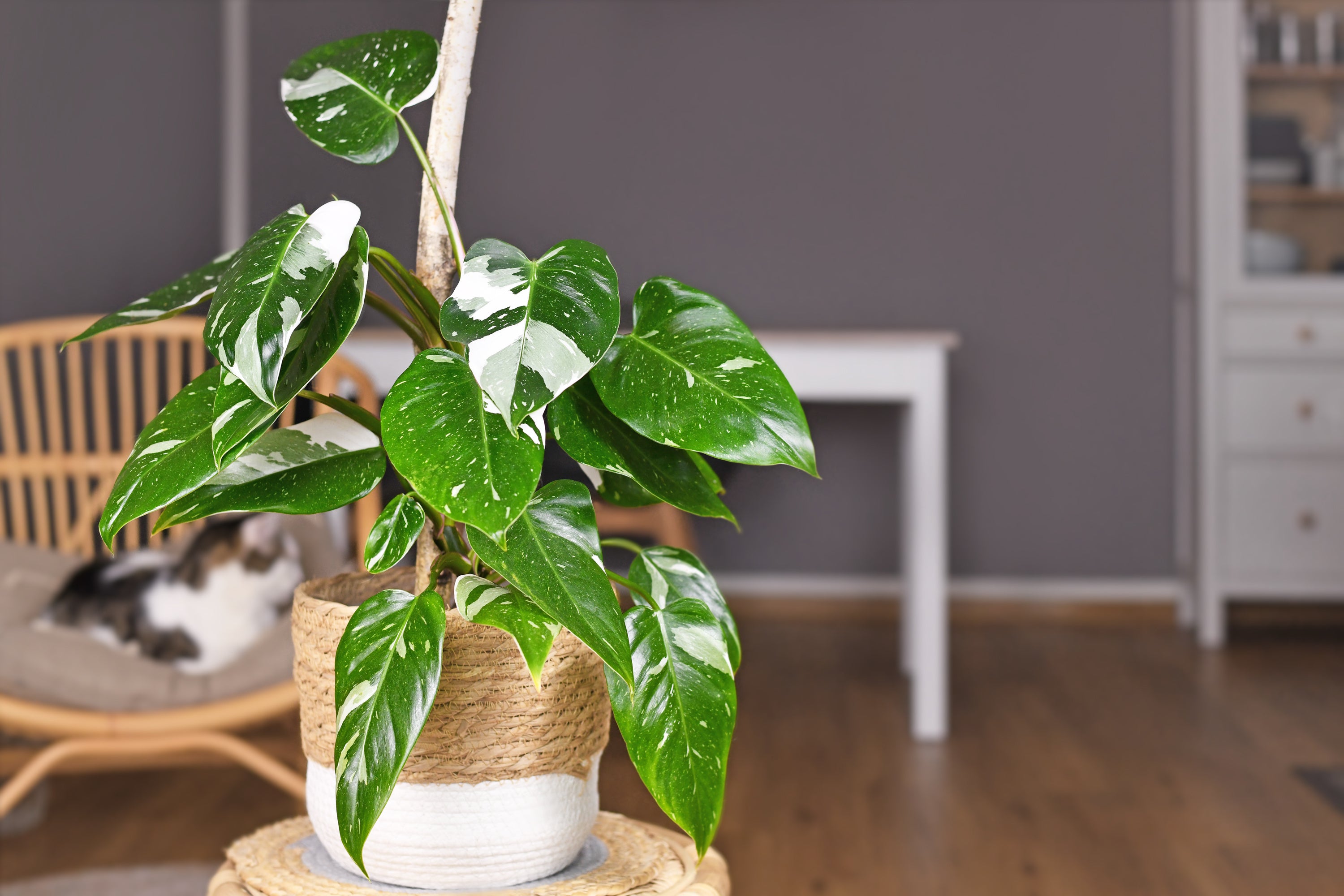Welcome, plant parents! Embark on a journey through the royal court of Philodendrons, exploring the White Knight, Pink Princess, White Princess, and White Wizard. Whether you're a novice or an experienced gardener, these beautiful plants will enchant you with their unique characteristics.
White Knight Philodendron
The White Knight Philodendron is an elegant tropical rarity, adorned with variegated leaves and burgundy stems (also known as petioles) with white streaks.
Leaf Size and Shape
Its leaves grow to be about 6-8 inches long but have been seen up to 18 inches long in some cases, with an arrowhead or heart shape and variegated patterns of white and green.
Stem Color
The stems are uniquely colored in a dark brown/purple hue with defined white lines throughout, providing a striking contrast to the vibrant foliage.
Care
It thrives in bright, indirect sunlight, well-draining soil, and requires careful watering to avoid over-watering - philodendrons in general are prone to root rot. A humid environment will ensure optimal growth.
Propagation
Stem cuttings can be used for propagation. Plant a healthy cutting in water or soil, and watch the new roots flourish.
Pink Princess Philodendron
The Pink Princess Philodendron is a beloved cultivar, known for its stunning pink and green variegated leaves.
Leaf Size and Shape
Its leaves are heart-shaped and can grow up to 8 inches long, with vibrant splashes of baby pink mixed with green.
Stem Color
The stems are dark burgundy with occasional pink streaks, mirroring the coloration of the leaves. This pink philodendron variant loves to climb so we suggest adding a moss pole when potting.
Care
This plant prefers medium to bright indirect light, well-draining soil, and moderate humidity. It's sensitive to over-watering, so monitoring soil moisture is crucial.
Propagation
Propagation is typically done through stem cuttings, preferably with a node that includes some pink variegation to retain the unique coloration in the new plant.
White Princess Philodendron
The White Princess Philodendron resembles the Pink Princess but with white variegation instead of pink.
Leaf Size and Shape
The leaves are slightly smaller, around 5-6 inches long, with a mix of green and white variegation. They tend to be a bit more oval shaped as well. Yet a rare occurrence, this hard-to-find houseplant can produce a splash of pink variegation in its leaves, given the perfect growing condition.
Stem Color
Stems are typically green with some white & pink streaks common, complementing the lush leaves.
Care
Care requirements are similar to the Pink Princess, with a preference for bright, indirect light and careful watering.
Propagation
Propagation can be achieved through stem cuttings, ensuring a balance of white and green in the chosen cutting.
White Wizard Philodendron
The White Wizard Philodendron is notable for its large, green leaves with striking white variegation.
Leaf Size and Shape
The leaves are a bit more narrow but follow the same heart shaped pattern as its cousin's. The White Wizard can growing leaves up to 10 inches in length, with contrasting white and green patterns.
Stem Color
Stems are green and white, providing a consistent backdrop to the remarkable foliage. If ever you see streaks of pink, brown, or burgundy, chances are you're not looking at a White Wizard.
Care
It requires similar care to other Philodendrons, with a preference for bright, indirect light, well-draining soil, and a watchful eye on watering.
Propagation
Propagation is done through stem cuttings, ensuring a piece with both white and green for the best results.
How To Increase Variegation Among The Philodendron Royals
Variegation is a coveted characteristic among plant enthusiasts. However, maintaining and enhancing this trait requires understanding and attention.
Light
Bright, indirect sunlight encourages variegation. Too little light may cause the plant to revert to green, while direct sunlight might scorch the leaves.
Fertilization
Using a balanced, slow-release fertilizer helps in maintaining variegation. Over-fertilizing can lead to loss of variegation as the plant may grow too quickly.
Pruning
If you notice a revert to solid green, careful pruning can help. Cut back the non-variegated parts to encourage the plant to produce more variegated growth.
Propagation
When propagating, ensure that the cutting includes parts of the variegated foliage to increase the likelihood of the new plant retaining this feature.
Common Care Struggles With Philodendron Variants
Being a new plant parent is thrilling but can come with challenges. Here are some areas that might need extra attention:
Watering
Over-watering is a common mistake, leading to root rot. Ensure proper drainage, and allow the soil to dry slightly between waterings.
Humidity
These tropical plants thrive in humid conditions. If you live in a dry climate, consider using a humidifier or placing a water tray near the plants.
Soil
Choosing the right soil mix is vital. A well-draining soil with organic matter helps in maintaining the right moisture levels.
Light
Understanding the light requirements and placing your plant in an appropriate spot is key. Avoid direct sunlight and opt for a bright, indirect light source.
Remember, patience and attention to detail are your allies in nurturing these beautiful royals of the Philodendron family. Happy planting!






